Sisterhood as we know in feminism toppled patriarchal ideas in the 1960s and took cognisance of the importance of the female experience and unity on the basis of occupying the same gender in the oppressive socio political system. It was deconstructed after the 80s with the overriding importance of intersectional understanding of oppression and gave voice to the politics of difference. The best and the worst part about ‘coming out’ on social media about my account of sexual harassment by a very infamous dada of Presidency University was the strategic but subtle victim shaming that I was subjected to by my erstwhile near and dear ones aka didis (sisters). We call sisters didi in Bengali and they occupy a very precarious position in our lives as women. This term could be made randomly to any stranger you talk to, but is also used for your very intimate ones.
Solidarity had been at the heart of student politics in Presidency University during my days as an undergraduate. For a woman, coming from upper class/caste social position, I had never as such experienced violent gender discrimination in the academic spaces. However, with upward mobility comes the question of meritocracy too. My erstwhile boyfriend Deborshi Chakraborty (who had now discarded his Brahmin identity and added ‘Azad’ to his name, ideologically or strategically I am not sure) would often mock me on my academic credibility the moment I left Kolkata for my studies.
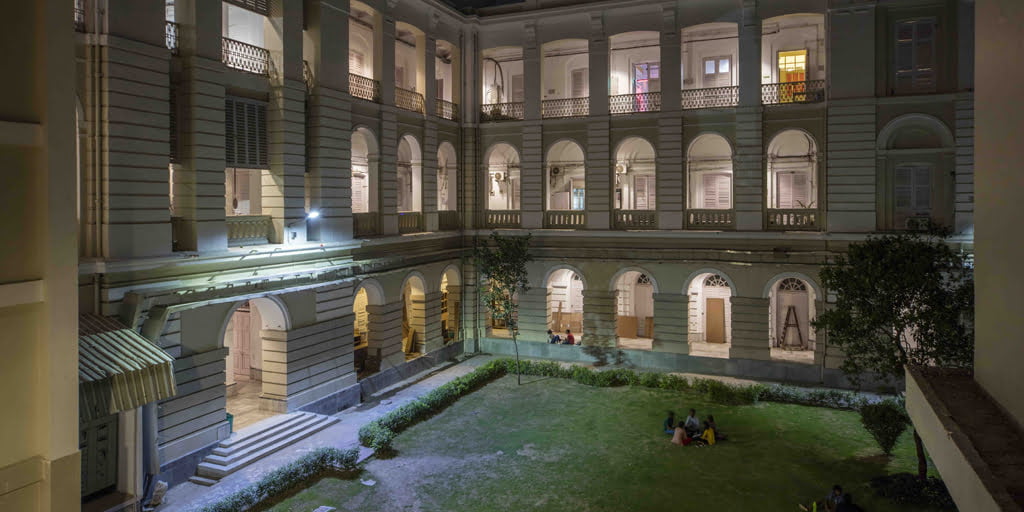
My Rapist And His Violent Manipulation Of Consent
Time and again he would force me to come back to Kolkata, and one day the situation turned so sour that he taunted me saying, ‘Well could you manage a gold medal like I did?‘ At certain times, while I was still studying in the same college as him in Kolkata, he would make extra efforts to cover my bare back just because I had donned a sleeveless blouse for the fest night in Presidency University. He would also force me to ‘simply ignore’ the sexual harassment complaints that surfaced in campus saying ‘those women’ just wanted to malign the leading student’s organization.
At certain times, while I was still studying in the same college as him in Kolkata, he would make extra efforts to cover my bare back just because I had donned a sleeveless blouse for the fest night. He would also force me to ‘simply ignore’ the sexual harassment complaints that surfaced in campus saying ‘those women’ just wanted to malign the leading student’s organization.
‘Real issues’ on campus weren’t misogyny, sexual violence, homophobia (we had a feminist organization called Ardhek Akash working on campus who failed to take cognisance of these cases that were voiced by survivors and in my case too they had been strategically and ‘consciously’ silent), rather ‘saffronization’ ‘privatization’ ‘corporatization’…as many jargon as you might fancy. Then one fine day, I was made to sit and ‘learn’ that my identity had been diminished and increasingly seen as ‘someone’s’ girlfriend.
Three years back when I called off the relationship because I was too bogged down by the toxic politics that went around surrounding my identity and my credibility and innumerable rounds of forcibly ‘sending nudes’ to my erstwhile rapist and faking orgasms on the phone (I was late to realise the rape culture), I decided to not repress my sexuality and my desire just to satiate some abstract categories like ‘loyalty’, ‘love’, ‘honesty’ or ‘integrity’. When my bodily integrity was falling into bits and pieces and my mental agency tampered with, I didn’t regret moving into another sexual relation that was rooted on consent. What followed, sealed the nail to the coffin.
When I was still rethinking about giving my rapist a chance, he forcibly ended up at my place despite my disapproval and asked me to stop going to the washroom to change my clothes (because I had already become uncomfortable with his presence) and asked me why I couldn’t get naked in front of him, given we had been in a relationship for over four years then.
It struck me; the extent of the ‘normalisation of abuse’ especially when despite so many red flags I went on to share the same space with him for the preceding nights till one night he forced himself upon me. When I refused, he went on to say that I wouldn’t obviously ‘enjoy’ his touch because I had been ‘sleeping around’. The next day was luckily the day my trial ended and I retreated into my space tired and assured there was no reason to rekindle a relationship that had till date only been a violent manipulation of consent.
It struck me; the extent of the ‘normalisation of abuse’ especially when despite so many red flags I went on to share the same space with him for the preceding nights till one night he forced himself upon me. When I refused, he went on to say that I wouldn’t obviously ‘enjoy’ his touch because I had been ‘sleeping around’.
But it didn’t exactly end. When I stood my ground I was harassed by him on the streets, blackmailed inside my own house and every space I inhabited reminded me of him till I very rarely came home to my parents. Every day, I woke up to my juniors, seniors and comrades in Presidency University writing and reminding their accounts and each moment triggered me. That was my moment I suppose, of what Adrienne Rich called the ‘woman identification’.
The Support From Feminists: Adrienne Rich And My Experiences
Privilege comes in different forms and my privilege made my own experience invisible. I grappled to find a language and I failed every time. I failed because I thought what would ‘pass off’ as casual sexism (part and parcel of dating men) was actually a part of the larger patriarchal ideology that scorned women for being themselves. Being my own or rather reclaiming my sense of being was possible for those various ‘moments’ that gave me courage and enabled me to write because resorting to state support often invisibilises the agency of the survivor on her account and her subjectivity and her ideas of justice.
The woman identification comes hard because of years of gender socialisation in the family, schools, universities where women conform to the position of being secondary to men, their pleasures, rights and priorities are subordinated to men. Sounds classical? But there it stands in our everyday lives and we as feminists have our own moments to disown the ‘man identification’ and learn to put ourselves first. In the light of coercive forces that promote heterosexuality, Rich writes, ‘Woman identification is a source of energy, a potential springhead of female power, curtailed and contained under the institution of heterosexuality’. It was the same privilege of having access to such accounts memoirs and voices of resistance where I found my own voice.
Rich touched my heart when she states in her work, ‘Compulsory Heterosexuality and Lesbian Existence’, how feminists themselves had obliterated lesbian memoirs and memories of love friendship and resistance in their lived realities of gendered violence and that, it was necessary as feminists, as occupiers of the body and subjectivity and experience that we reclaim those ‘silences’ ‘obituaries’ ‘stories’ ‘herstories’ through what she believes a ‘lesbian continuum’.
We are no alien to the innumerable moments where we on the occasion of expressing love and intimacy to our women friends had been subject to homophobic ridicule or our concerted efforts to fight and reclaiming voice simply buried under ‘larger issues’. All of us have our fair share. Rich soothes the wound and replenishes the zeal to expand the homoerotic love and sexuality to everyday forms of solidarity, togetherness, and political intervention.
Also read: Justice Denied, Despite Multiple Complaints Of Sexual Harassment At Presidency University, Kolkata
She calls it a continuum because it is not definitive or exclusionary. It is affective and based on comradeship and friendship to reclaim not only the voices that are deliberately silenced but also remember our own experiences, recognising each other’s strengths. What the second wave feminists would call ‘sisterhood’, Rich redirects solidarity also towards the every day mode of resistance we forge and help each other forge. She calls it ‘the bonding against male tyranny, the giving and receiving of practical and political support’.
Back Where I Began
The obliteration was very much visible; the political organisations, the (anti) feminist organisations, his comrades from Presidency University are all deafeningly silent. In fact, I was told by a very dear senior of mine (aka didi) that she didn’t expect me to join this ‘trend’. That hurt me the most given she was a woman herself and well informed upwardly mobile very much like most of us who ‘educates, organises and agitates’. With the streams of anti NRC-CAA protests happening, I stopped myself from attending the protests where ‘Mr Azad’ was expected to speak at the podium.
I didn’t want to be a part of those as it disturbed me to the core of my heart to see my rapist on such a pedestal and his enablers cheering him on. Well some of them (very few) had reached out to me but again privilege matters. Privilege drifted them to their comfort zone of silence and conformity. Amidst so much silence, he did text me and these were his words besides saying that he was sorry, ‘Just that never thought it will go down here. I have my thesis submission. Before that it was literally a huge psychological blow for me, but that cannot be any reason for you not to express yourself. More power to you’.
Upper caste patriarchy and savarna men love to give ‘more power’, love to proclaim themselves atheist, leftist, radicals…till they turn us into mere enablers. I have zero empathy for people like him and I have only hatred for his enablers, and I would keep voicing, writing and reminding myself and every one to stop worshiping such patriarchal toxic men masquerading as intellectuals. Their cause is a failed cause!
Read. Re-read. Over-read. Felt guilty and then chided myself to feel like that because this is exactly how patronising patriarchy is. Thesis submission had to come in between a note of apology, and not the survivor’s mental and physical state. Upper caste patriarchy and savarna men love to give ‘more power’, love to proclaim themselves atheist, leftist, radicals…till they turn us into mere enablers. I have zero empathy for people like him and I have only hatred for his enablers, and I would keep voicing, writing and reminding myself and every one to stop worshiping such patriarchal toxic men masquerading as intellectuals. Their cause is a failed cause!
Also read: Pride March At Presidency University Hijacked By Straight ‘Allies’
My account isn’t that of an individual’s. It is a reflection of the toxic politics that goes on in the most literate political circles of Kolkata, in the alleys of the ivory towers, in the pages of academia and in the so called ‘praxis’ that they fancy. My account was strengthened by my friends and comrades who I had almost forgotten in the course of hate politics that was practiced in such spaces. They reached out, lend me the space to cry and express. The network that faded into the everyday, re-figured with these moments.
I wouldn’t say I hadn’t ever been an enabler. In fact, all of us were. We embodied the same political space of Presidency University and normalised the same problematic politics with this collective silence that so many women and people belonging to the marginalised communities and sexualities were oppressed by, by the same structures time and again. But experience and memory are powerful tools. They form this continuum of love, sexuality and friendship that proved stronger than such misogyny that went on across campuses.
Rich reminded me of them; my friends my confidantes, my women. #MeToo is solidarity with cause having larger implications. Our pens and mouths won’t stop no matter how hard they may try to erase them. Our accounts are our weapons and a feminist revolution is incomplete without an armed literature. Our emotions are political; let them reclaim all possible spaces of patriarchal occupation. Reach out, seek support and never be ashamed of your own convictions. You have indeed come a long way.
Featured Image Source: Feminism In India
Artwork by: Arpita Biswas
About the author(s)
I am a student of sociology and gender studies. I did my masters in sociology at Delhi School of Economics. However my interest in gender studies had intrigued me to take up this course seriously. Currently I am enrolled for masters at Ambedkar University Delhi. My interest areas lie in researching on the epistemology of protest, nationalism, queerness , the sociology of the family, student politics, work, body and labour. I aspire to write more and bring my insights closer to activism. Intersectional understanding for me had helped me become a better political individual.
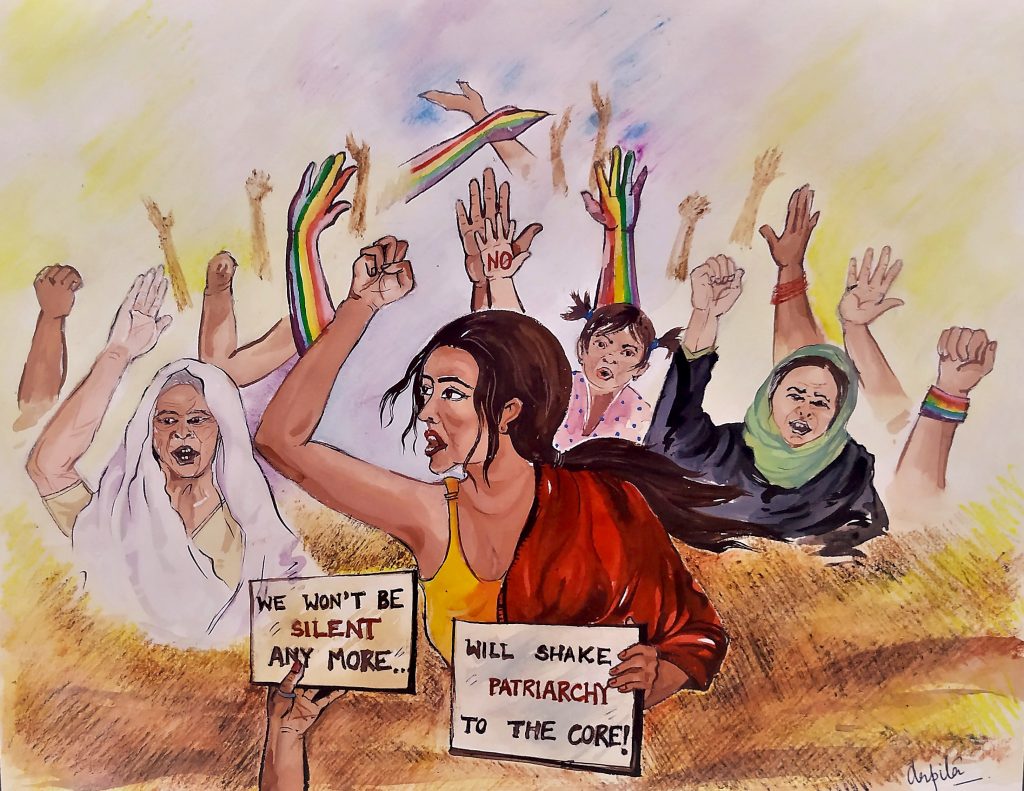
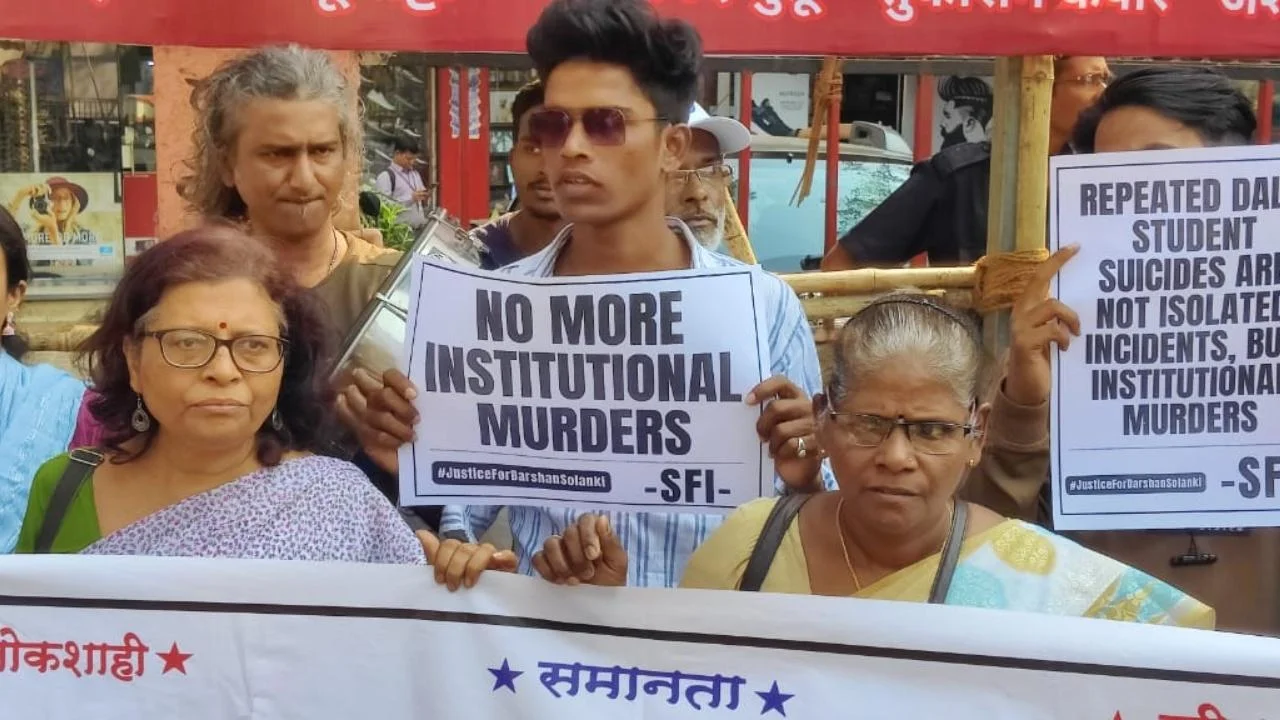
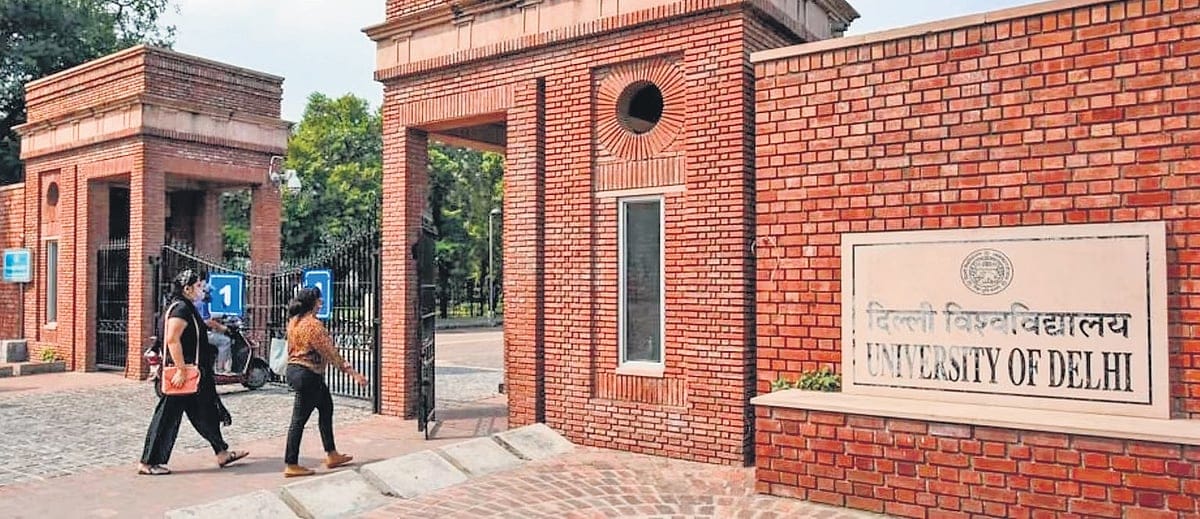
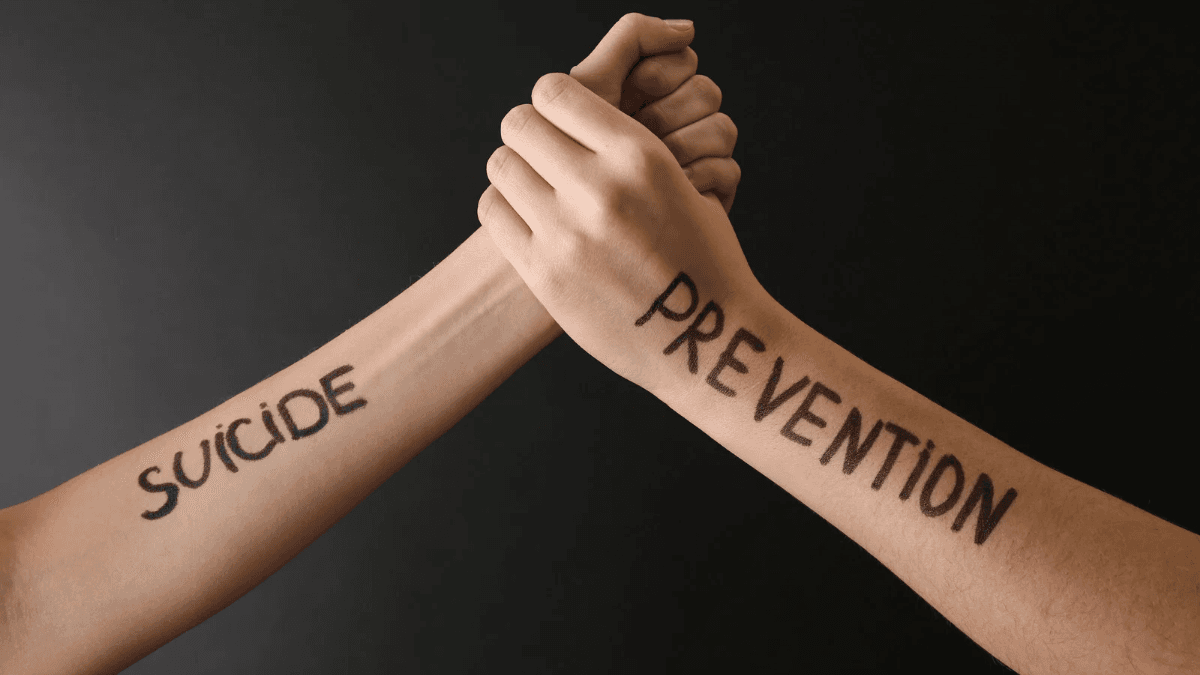

Thank you for sharing, articulating, challenging and breaking through. This piece was a cathartic read. More words to you 🙂
Thank you Astha 🙂
More power to your art and canvas.